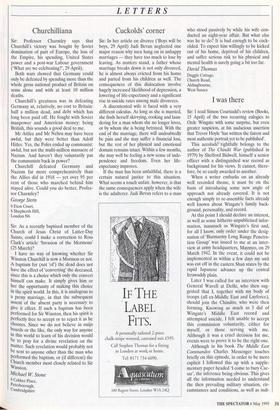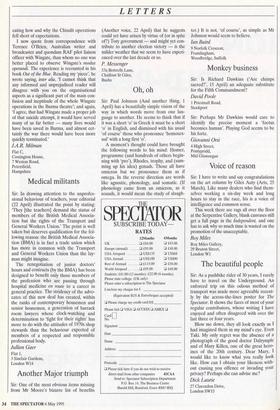I was there
Sir: I read Simon Courtauld's review (Books, 15 April) of the two recurring eulogies to Orde Wingate with some surprise, but even greater suspicion, at his audacious assertion that Trevor Hoyle 'has written the fairest and most authentic portrait yet to be published'. This accolade` rightfully belongs to the author of The Chindit War (published in 1979) by Shelford Bidwell, himself a senior officer with a distinguished war record as background for his views. It cannot, there- fore, be so easily awarded to another.
When a writer embarks on an already well recorded theme, it must be on the basis of introducing some new angle of approach not already covered. It is not enough simply to re-assemble facts already well known about Wingate's family back- ground, personality, and record.
At this point I should declare an interest, as well as some hitherto unpublicised infor- mation, inasmuch as Wingate's first and, for all I know, only order under the desig- nation of 'Burmarmy Long Range Penetra- tion Group' was issued to me at an inter- view at army headquarters, Maymyo, on 29 March 1942. In the event, it could not be implemented as within a few days my unit was cut off in the eastern Shan states by the rapid Japanese advance up the central Irrawaddy plain.
Later I was called for an interview with General Wavell at Delhi, who then sug- gested that I, together with my body of troops (all ex-Middle East and Layforce), should join the Chindits, who were then forming. Knowing as much as I did of Wingate's Middle East record and attempted suicide, I felt unable to accept this commission voluntarily, either for myself, or those serving with me. Although it was a cruel decision for me, events were to prove it to be the right one.
Although in his book The Middle East Commandos Charles Messenger touches briefly on this episode, in order to be more explicit I followed this up with a supple- mentary paper headed 'I come to bury Cae- sar', the inference being obvious. This gives all the information needed to understand the then prevailing military situation, cir- cumstances and conditions, as well as indi- cating how and why the Chindit operations fell short of expectations.
I now quote from correspondence with Terence O'Brien, Australian writer and broadcaster and quondam RAF pilot liaison officer with Wingate, than whom no one was better placed to observe Wingate's modus operandi. The experience is recounted in his book Out of the Blue. Reading my 'piece', he wrote saying, inter alia, 'I cannot think that any informed and unprejudiced reader will disagree with you on the organisational aspects as a significant part of the main con- fusion and ineptitude of the whole Wingate operations in the Burma theatre'; and again, `I agree, that had Wingate made a proper job of that suicide attempt, it would have served many of us far better — many lives would have been saved in Burma, and almost cer- tainly the war there would have been more quickly terminated.'
JA R. Milman
Flat C, Cossington House, 7 Weston Road, Petersfield, Hampshire



































































 Previous page
Previous page